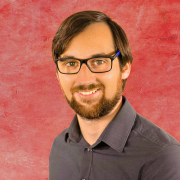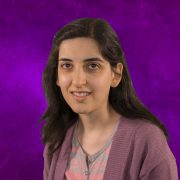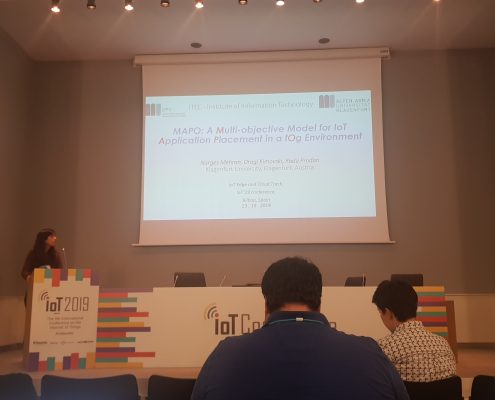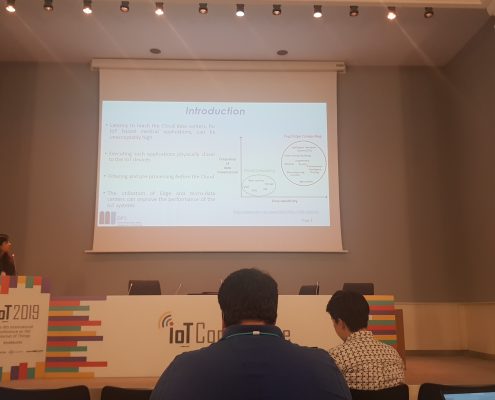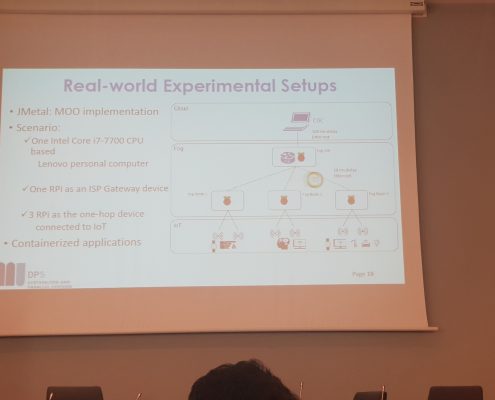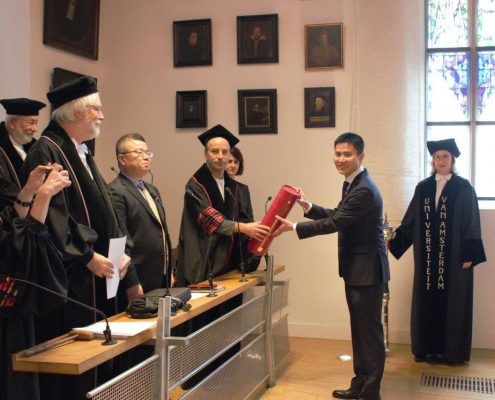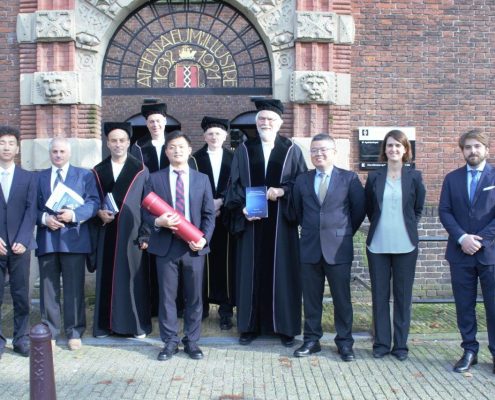The paper “Making simulation results reproducible—Survey, guidelines, and examples based on Gradle and Docker” has been accepted and published in PeerJ Computer Science.
Authors: Wilfried Elmenreich, Philipp Moll, Sebastian Theuermann, Mathias Lux (Alpen-Adria-Universität Klagenfurt)
Abstract: This article addresses two research questions related to reproducibility within the context of research related to computer science. First, a survey on reproducibility addressed to researchers in the academic and private sectors is described and evaluated. The survey indicates a strong need for open and easily accessible results, in particular, reproducing an experiment should not require too much effort. The results of the survey are then used to formulate guidelines for making research results reproducible. In addition, this article explores four approaches based on software tools that could bring forward reproducibility in research results. After a general analysis of tools, three examples are further investigated based on actual research projects which are used to evaluate previously introduced tools. Results indicate that the evaluated tools contribute well to making simulation results reproducible but due to conflicting requirements, none of the presented solutions fulfills all intended goals perfectly.
The full paper can be found on: https://peerj.com/articles/cs-240/
Authors: Hadi Amirpour, Ekrem Çetinkaya (Alpen-Adria-Universität Klagenfurt), Christian Timmerer (Alpen-Adria-Universität Klagenfurt, Bitmovin), and Mohammad Ghanbari (University of Tehran, University of Essex)
Abstract: Adaptive HTTP streaming is the preferred method to deliver multimedia content on the internet. It provides multiple representations of the same content in different qualities (i.e., bit-rates and resolutions) and allows the client to request segments from the available representations in a dynamic, adaptive way depending on its context. The growing number of representations in adaptive HTTP streaming makes encoding of one video segment at different representations a challenging task in terms of encoding time-complexity. In this paper, information of both highest and lowest quality representations are used to limit Rate Distortion Optimization (RDO) for each Coding Unit Tree (CTU) in High Efficiency Video Coding. Our proposed method first encodes the highest quality representation and consequently uses it to encode the lowest quality representation. In particular, the block structure and the selected reference frame of both highest and lowest quality representations are then used to predict and shorten the RDO process of each CTU for intermediate quality representations. Our proposed method introduces a delay of two CTUs thanks to employing parallel processing techniques. Experimental results show a significant reduction in time-complexity over the reference software (38%) and state-of-the-art (10%) is achieved while quality degradation is negligible.
Keywords: HTTP adaptive streaming, Multi-rate encoding, HEVC, Fast block partitioning
The manuscript “Simplified Workflow Simulation on Clouds based on Computation and Communication Noisiness” has been accepted for
publication in the IEEE Transactions on Parallel and Distributed Systems journal (TPDS) with an impact factor of 4.181.
Authors: Roland Mathá, Sasko Ristov, Thomas Fahringer, Radu Prodan.
Abstract: Many researchers rely on simulations to analyze and validate their researched methods on Cloud infrastructures. However, determining relevant simulation parameters and correctly instantiating them to match the real Cloud performance is a difficult and costly operation, as minor configuration changes can easily generate an unreliable inaccurate simulation result. Using legacy values experimentally determined by other researchers can reduce the configuration costs, but is still inaccurate as the underlying public Clouds and the number of active tenants are highly different and dynamic in time. To overcome these deficiencies, we propose a novel model that simulates the dynamic Cloud performance by introducing noise in the computation and communication tasks, determined by a small set of runtime execution data. Although the estimating method is apparently costly, a comprehensive sensitivity analysis shows that the configuration parameters determined for a certain simulation setup can be used for other simulations too, thereby reducing the tuning cost by up to 82.46%, while declining the simulation accuracy by only 1.98% in average. Extensive evaluation also shows that our novel model outperforms other state-of-the-art dynamic Cloud simulation models, leading up to 22% lower makespan inaccuracy.
Acknowledgments: This work has been supported by the ASPIDE Project funded by the European Union’s Horizon 2020 Research and Innovation Programme under grant agreement No 801091.
An der Universität Klagenfurt wird das CD Labor für Adaptive Streaming over HTTP and Emerging Networked Multimedia Services eingerichtet. Die Mission des Labors ist die Erforschung neuer Tools und Methoden für die Codierung, den Transport und die Wiedergabe von Live- und On-Demand-Videos mithilfe des HTTP-Adaptive-Streaming-Verfahrens. In Christian Doppler Labors wird anwendungsorientierte Grundlagenforschung auf hohem Niveau betrieben, hervorragende WissenschaftlerInnen kooperieren dazu mit innovativen Unternehmen. Für die Förderung dieser Zusammenarbeit gilt die Christian Doppler Forschungsgesellschaft international als Best-Practice-Beispiel. Christian Doppler Labors werden von der öffentlichen Hand und den beteiligten Unternehmen gemeinsam finanziert. Wichtigster öffentlicher Fördergeber ist das Bundesministerium für Digitalisierung und Wirtschaftsstandort (BMDW). Wir laden Sie herzlich zur feierlichen Eröffnung des CD Labors ein. Read more
The manuscript “Multi-objective scheduling of extreme data scientific workflows in Fog” has been accepted for publication in the “Future Generation Computer Systems” journal published by Elsevier. The journal is ranked in the Q1 (SJR) in the areas of “Hardware and Architectures” and “Computer Networks and Communications” with an Impact Factor of 5.768 (Journal Citations Reports). The manuscript was prepared in collaboration with the Technical University of Vienna.
Authors: Vincenzo De Maio and Dragi Kimovski
Abstract: The concept of “extreme data” is a recent re-incarnation of the “big data” problem, which is distinguished by the massive amounts of information that must be analyzed with strict time requirements. In the past decade, the Cloud data centers have been envisioned as the essential computing architectures for enabling extreme data workflows. However, the Cloud data centers are often geographically distributed. Such geographical distribution increases offloading latency, making it unsuitable for processing of workflows with strict latency requirements, as the data transfer times could be very high. Fog computing emerged as a promising solution to this issue, as it allows partial workflow processing in lower-network layers. Performing data processing on the Fog significantly reduces data transfer latency, allowing to meet the workflows’ strict latency requirements. However, the Fog layer is highly heterogeneous and loosely connected, which affects reliability and response time of task offloading. In this work, we investigate the potential of Fog for scheduling of extreme data workflows with strict response time requirements. Moreover, we propose a novel Pareto-based approach for task offloading in Fog, called Multi-objective Workflow Offloading (MOWO). MOWO considers three optimization objectives, namely response time, reliability, and financial cost. We evaluate MOWO workflow scheduler on a set of real-world biomedical, meteorological and astronomy workflows representing examples of extreme data application with strict latency requirements.
Acknowledgments: ASPIDE H2020 and ATOMICFOG ÖAD AT/MK 2018
The paper has been accepted (through double-blind peer review) as a regular paper of the Euromicro PDP’2020 conference to be held in Vasteras, Sweden on 11-13 March, 2020.
Title: M3AT: Monitoring Agents Assignment Model for Data-Intensive Applications
Authors: Vladislav Kashansky, Dragi Kimovski, Radu Prodan, Prateek Agrawal, Fabrizio Marozzo, Iuhasz Gabriel, Marek Justyna and Javier Garcia-Blas
Abstract: Nowadays, massive amounts of data are acquired, transferred, and analyzed nearly in real-time by utilizing a large number of computing and storage elements interconnected through high-speed communication networks. However, one issue that still requires research effort is to enable efficient monitoring of applications and infrastructures of such complex systems. In this paper, we introduce a Integer Linear Programming (ILP) model called M3AT for optimised assignment of monitoring agents and aggregators on large-scale computing systems. We identified a set of requirements from three representative data-intensive applications and exploited them to define the model’s input parameters. We evaluated the scalability of M3AT using the Constraint Integer Programing (SCIP) solver with default configuration based on synthetic data sets. Preliminary results show that the model provides optimal assignments for systems composed of up to 200 monitoring agents while keeping the number of aggregators constant and demonstrates variable sensitivity with respect to the scale of monitoring data aggregators and limitation policies imposed.
Keywords: Monitoring systems, high performance computing, aggregation, systems control, data-intensive systems, generalized assignment problem, SCIP optimization suite.
Acknowledgement: This work has received funding from the EC-funded project H2020 FETHPC ASPIDE (Agreement #801091)
Save the date! 3rd Winter Game Jam is around the corner: Dec 20-22, 2019! Make sure to get a ticket asap on https://itec.aau.at/gamejam
Thanks to our sponsors Anexia, Alpen-Adria Universität Klagenfurt, Alturos, Bitmovin, Dynatrace, Sensolligent, and Imendo for supporting us!
What is a game jam? The 3rd Winter Game Jam is open to everyone who likes games and wants to create, test and talk about games. Starting on Friday the topic will be revealed to all participants at the same time and random groups will brainstorm games. Then, after the ideas are pitched, team will emerge around ideas and games are to be created. Finally, on Sunday, the projects are presented and can be played and tested.
Narges Mehran presented the paper “MAPO: A Multi-Objective Model for IoT Application Placement in a Fog Environment” at the 9th International Conference on the Internet of Things, IoT 2019 in Bilbao, Spain (October 22-25, 2019).
Authors: Narges Mehran, Dragi Kimovski, Radu Prodan (Alpen-Adria Universität Klagenfurt).
Abstract: The emergence of the Fog computing paradigm that leverages in-network virtualized resources raises important challenges in terms of resource and IoT application management in a heterogeneous environment with limited computing resources. In this work, we propose a novel Pareto-based approach for application placement close to the data sources called Multi-objective IoT Application Placement in fOg (MAPO). MAPO models applications based on a finite state machine using three conflicting optimization objectives, completion time, energy consumption, and economic cost, and considering both the computation and communication aspects. In contrast to existing solutions that optimize a single objective, MAPO enables multi-objective energy and cost-aware application placement. To evaluate the quality of the MAPO placements, we created both simulated and real-world testbeds tailored for a set of medical IoT application case studies. Compared to the state-of-the-art approaches, MAPO reduces the economic cost by 28%, while decreasing the energy requirements by 29-64% on average, and improves the completion time by a factor of six.
Track: IoT Edge and Cloud @IoT’19
Acknowledgement: Austrian Research Promotion Agency (FFG), project 848448, Tiroler Cloud, funded this work.
Prof. Radu Prodan participated at the PhD examination of Dr. Yang Hu and Dr. Huan Zhou at the University of Amsterdam, Netherlands.
With: Prof. Peter van Emde Boas, Prof. Cees de Laat, Prof. Henri E. Bal, Dr. Paola Grosso, Dr. Zhiming Zhao, Prof. Rob van Nieuwpoort, Prof. Pieter Adriaans, Dr. Adam S.Z. Belloum

